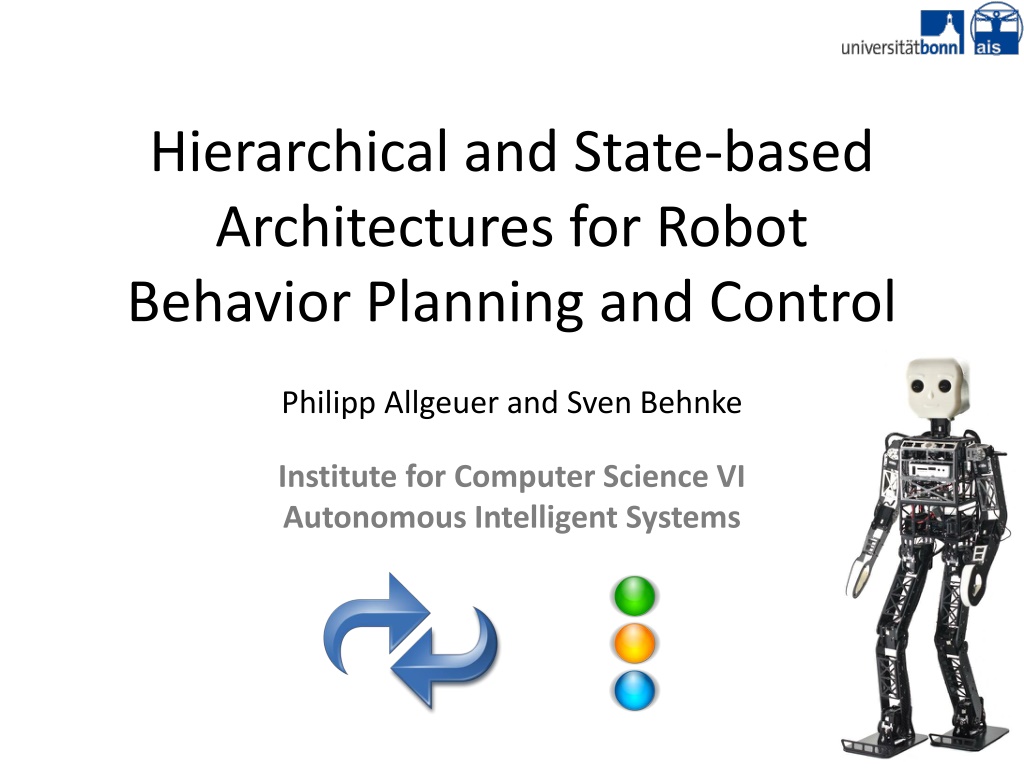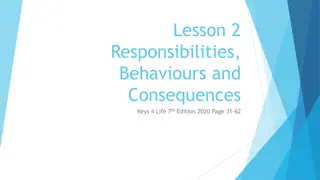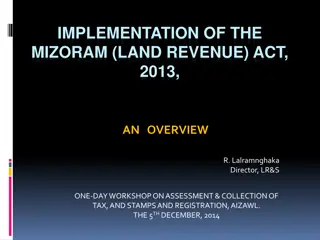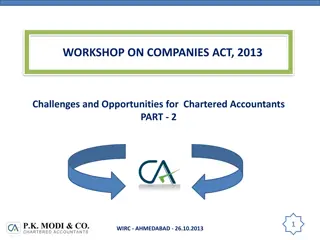
Robot Behavior Planning and Control Architectures
Explore hierarchical and state-based architectures for robot behavior planning and control, including motivation, approaches, frameworks, and components. Learn about the State Controller Library (SCL) and its platform-independent C++ framework for implementing finite state machines and hierarchical state machines efficiently.
Download Presentation

Please find below an Image/Link to download the presentation.
The content on the website is provided AS IS for your information and personal use only. It may not be sold, licensed, or shared on other websites without obtaining consent from the author. If you encounter any issues during the download, it is possible that the publisher has removed the file from their server.
You are allowed to download the files provided on this website for personal or commercial use, subject to the condition that they are used lawfully. All files are the property of their respective owners.
The content on the website is provided AS IS for your information and personal use only. It may not be sold, licensed, or shared on other websites without obtaining consent from the author.
E N D
Presentation Transcript
Hierarchical and State-based Architectures for Robot Behavior Planning and Control Philipp Allgeuer and Sven Behnke Institute for Computer Science VI Autonomous Intelligent Systems
Motivation What is a behavior? An observable and coordinated pattern of activity of an agent Why do we need behavior control? Complete the required task, artificial intelligence Respond to external stimuli Formalize a plan of actions How can we implement it? Using a modular, efficient library or framework 2 Oct 15, 2013 Behavior Architectures for Planning and Control
Approaches State Controller Library State-based Architecture Finite state machine Hierarchical state machine Behavior-based Architecture Subsumption Architecture Agent Network Architecture (ANA) Behavior Languages XABSL, The Behavior Language, Colbert Configuration Description Language Behavior Control Framework 3 Oct 15, 2013 Behavior Architectures for Planning and Control
Overview of the Frameworks State Controller Library Behavior Control Framework http://sourceforge.net/projects/statecontroller/ http://sourceforge.net/projects/behaviourcontrol/ 4 Oct 15, 2013 Behavior Architectures for Planning and Control
State Controller Library (SCL) Platform independent C++ framework Can be used to implement: Finite state machines Hierarchical state machines Multi-action planning generalizations thereof Framework attributes: Small, simple, resource efficient, modular Suitable for small to medium applications Designed with usability in mind 5 Oct 15, 2013 Behavior Architectures for Planning and Control
Components of the SCL State Controller Class/object that encapsulates and manages one instance of an entire state machine State A possible state type of the controller (class in C++) State Instance An instance of a State (instance of the C++ class) State Queue An ordered list of desired future state instances 6 Oct 15, 2013 Behavior Architectures for Planning and Control
Components of the SCL A state instance may specialize a state with the use of state parameters. 7 Oct 15, 2013 Behavior Architectures for Planning and Control
Executing the SCL Qn: Did the current state set the finished flag in the last step? Timed Loop No: Execute the current state again while(true) { ... SCL->step(); ... } Yes: Deactivate current state Pop the next state from the state queue and set it as the current state Activate the new state Execute the new state 8 Oct 15, 2013 Behavior Architectures for Planning and Control
Executing the SCL Callbacks are implemented by each state to perform the required activation, execution and deactivation. States make plans and set their successor state by modifying the state queue and setting the finished flag. Plans can be altered by clearing or modifying the queue. Hierarchical state machines are implemented by nesting state controller objects within each other. 9 Oct 15, 2013 Behavior Architectures for Planning and Control
Example of SCL Simple Soccer Goalie Behavior 10 Oct 15, 2013 Behavior Architectures for Planning and Control
Behavior Control Framework (BCF) Platform independent C++ framework Can be used to implement: A hierarchical behavior architecture that utilizes the concept of inhibitions to allow for dynamic transitioning between multiple running behaviors Framework attributes: Lightweight, resource efficient, modular Suitable for medium to large applications Designed with usability in mind 11 Oct 15, 2013 Behavior Architectures for Planning and Control
Components of the BCF Behavior Manager Class/object that encapsulates and manages one instance of an entire BCF architecture Behavior Layer A bundle of behaviors that can inhibit each other Behavior A class that implements a certain action/ability Actuators and Sensors Internal writers and readers used to share data 12 Oct 15, 2013 Behavior Architectures for Planning and Control
Components of the BCF Object hierarchy Data exchange Inhibitions 13 Oct 15, 2013 Behavior Architectures for Planning and Control
Behavior Inhibitions 1.0 1.0 1.0 1.0 0.0 0.0 Transitive Behavior 1 Behavior 1 Behavior 4 Chaining inhibition 0.5 0.0 0.0 Inhibition tree: Behavior 2 Non-chaining inhibition 1.0 0.0 0.0 0.7 0.7 0.7 Intransitive! Behavior 3 Behavior 5 Behavior 5 Topological ordering: 1 2 4 3 5 Activation levels are returned by each behavior Refactored in the topological order to get true activation levels Beh. 1 = 1.0, Beh. 2 = 0.5 True Beh. 2 = (1 1.0) 0.5 = 0.0 Behaviors with non-zero activation level are executed Inhibition resolution: 14 Oct 15, 2013 Behavior Architectures for Planning and Control
Actuator Aggregation Partial activation if activation level is between 0 and 1 Multiple writes to an actuator are weighted by the respective true activation levels of the behaviors 1.0 0.5 Behavior 1 Behavior 2 GC = 2.0 GC = 5.0 Gait Command 1.0 2.0 + 0.5 5.0 True GC = = 3.0 1.0 + 0.5 15 Oct 15, 2013 Behavior Architectures for Planning and Control
Data Interfaces Communication between layers Write data to virtual actuators Read data from virtual sensors Sensors are statically bound to actuators by name Single sender multiple receiver network of data Only single data copy operation is required Communication to external code Global interface layers (no child behaviors) e.g. Can be used to read/write from ROS topics 16 Oct 15, 2013 Behavior Architectures for Planning and Control
Example of BCF Higher Level Behavior Layer Behavior Layer Sample Sensors Vector to Ball Vision Detections Go Behind Ball Search for Ball Head Control Kick Ball Sample Actuators Gait Gaze Target Command Lower Level Behavior Layer 17 Oct 15, 2013 Behavior Architectures for Planning and Control
Using the Frameworks Together e.g. Walking Behavior Kicking Behavior Grasping Behavior BCF SCL 18 Oct 15, 2013 Behavior Architectures for Planning and Control
Framework Performance State Controller Library Executing a single state: Always transitioning: Enqueueing 2 items at a time: 292ns / 3.4MHz Enqueueing 5 items at a time: 307ns / 3.3MHz Enqueueing 10 items at a time: 343ns / 2.9MHz Behavior Control Framework Executing 3 layers, 2 behaviors: 282ns / 3.6MHz 43ns / 23.0MHz 320ns / 3.1MHz Tested on a single core of an Intel Xeon X5650 Processor (2.67GHz) 19 Oct 15, 2013 Behavior Architectures for Planning and Control
State Controller Library Behavior Control Framework C:\Users\Phil\Downloads\behaviour_control_icon.png C:\Users\Phil\Downloads\state_controller_ico.png State Controller Library Behavior Control Framework http://sourceforge.net/projects/statecontroller/ http://sourceforge.net/projects/behaviourcontrol/ Thank you for your attention! C:\Users\Phil\Downloads\scl_architecture.png C:\Users\Phil\Downloads\bcf_architecture.png 20 Oct 15, 2013 Behavior Architectures for Planning and Control






















